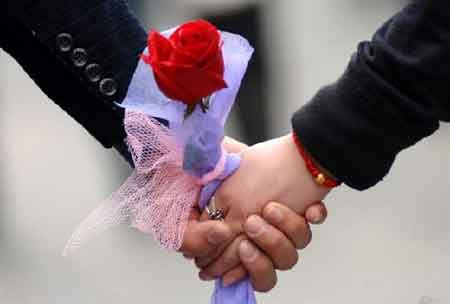當(dāng)前位置: Language Tips> 雙語新聞
Men and women can't be 'just friends'
分享到
 |
|
A new study suggests that men, relative to women, have a particularly hard time being “just friends.” |
|
Can heterosexual men and women ever be “just friends”? Daily experience suggests that non-romantic friendships between males and females are not only possible, but common. However, a new study suggests that men, relative to women, have a particularly hard time being “just friends.” In order to investigate the viability of truly platonic opposite-sex friendships, researchers brought 88 pairs of undergraduate opposite-sex friends into...a science lab. In order to ensure honest responses, the researchers not only followed standard protocols regarding anonymity and confidentiality, but also required both friends to agree to refrain from discussing the study, even after they had left the testing facility. These friendship pairs were then separated, and each member of each pair was asked a series of questions related to his or her romantic feelings toward the friend with whom they were taking the study. The results suggest large gender differences in how men and women experience opposite-sex friendships. Men were much more attracted to their female friends than vice versa. Men were also more likely than women to think that their opposite-sex friends were attracted to them—a clearly misguided belief. In fact, men’s estimates of how attractive they were to their female friends had virtually nothing to do with how these women actually felt, and almost everything to do with how the men themselves felt—basically, males assumed that any romantic attraction they experienced was mutual, and were blind to the actual level of romantic interest felt by their female friends. Women, too, were blind to the mindset of their opposite-sex friends; because females generally were not attracted to their male friends, they assumed that this lack of attraction was mutual. As a result, men consistently overestimated the level of attraction felt by their female friends and women consistently underestimated the level of attraction felt by their male friends. Men were also more willing to act on this mistakenly perceived mutual attraction. Both men and women were equally attracted to romantically involved opposite-sex friends and those who were single; “hot” friends were hot and “not” friends were not, regardless of their relationship status. However, men and women differed in the extent to which they saw attached friends as potential romantic partners. Although men were equally as likely to desire “romantic dates” with “taken” friends as with single ones, women were sensitive to their male friends’ relationship status and uninterested in pursuing those who were already involved with someone else. In a follow-up study, 249 adults (many of whom were married) were asked to list the positive and negative aspects of being friends with a specific member of the opposite sex. Variables related to romantic attraction (e.g., “our relationship could lead to romantic feelings”) were five times more likely to be listed as negative aspects of the friendship than as positive ones. However, the differences between men and women appeared here as well. Males were significantly more likely than females to list romantic attraction as a benefit of opposite-sex friendships, and this discrepancy increased as men aged. So, can men and women be “just friends?” If we all thought like women, almost certainly. But if we all thought like men, we’d probably be facing a serious overpopulation crisis. (Read by Brian Salter. Brian Salter is a journalist at the China Daily Website.) (Agencies) |
異性戀男女之間有沒有純粹的友誼?日常經(jīng)驗(yàn)告訴我們,男女之間純粹的友誼不僅僅是可能的,而且還很普遍。但最新研究表明,與女性對男性的態(tài)度相比,男性更不可能把女性當(dāng)作普通朋友看待。 為了研究異性之間是否存在真正純粹的友誼,研究人員挑選了88對大學(xué)生異性朋友參加了一項(xiàng)科學(xué)實(shí)驗(yàn)。為了確保大家給出誠實(shí)的回答,研究人員不僅遵從了匿名、保密等標(biāo)準(zhǔn)試驗(yàn)協(xié)議,而且要求異性朋友雙方避免討論這項(xiàng)研究,甚至是在試驗(yàn)結(jié)束后。這些異性朋友被分開,研究人員會(huì)單獨(dú)詢問每個(gè)人是否對參加試驗(yàn)的另一位朋友有好感等一系列問題。 研究結(jié)果顯示,男性與女性對待異性友誼的態(tài)度有很大差別。與女性對男性的態(tài)度相比,男性更容易喜歡上女性朋友。男性也更容易覺得女性朋友喜歡他們,這當(dāng)然是一種錯(cuò)覺。 事實(shí)上,男性對異性有多喜歡自己的估計(jì)幾乎和異性朋友的真實(shí)感受毫無關(guān)系,而僅與男性的自身感受有關(guān)。基本上,男性會(huì)假設(shè)自己體會(huì)到的所有浪漫吸引之情都是相互的,完全不知道異性朋友對自己到底有多大好感。女性也對男性的這種心態(tài)一無所知,因?yàn)榕酝ǔψ约旱漠愋耘笥褯]有好感,她們也會(huì)假定對方也不喜歡自己。結(jié)果就是,男性一直會(huì)高估異性對自己的好感,而女性則恰恰相反。 男性也更愿意為這種誤判的互相吸引付諸行動(dòng)。男性與女性被異性朋友吸引時(shí),都與對方是否單身無關(guān),在這一點(diǎn)上男女并無差異。帥哥靚妹更受歡迎,而長相平平的則無人傾心,與對方的感情狀況無關(guān)。 但在將“名花有主”的異性朋友視為潛在的浪漫對象的程度上,男女之間存在差別。盡管男性不管女性朋友是否單身,都期待和她的“浪漫約會(huì)”,但女性對男性朋友的感情狀況非常敏感,對追求已經(jīng)不再單身的男性沒有興趣。 在一次追蹤研究中,研究人員要求249名成年受訪者(其中很多人已婚)列出與某位異性保持友誼的優(yōu)缺點(diǎn)。與浪漫感情有關(guān)的變數(shù)(比如,我們的友誼可能會(huì)發(fā)展為戀愛)被列為缺點(diǎn)的幾率比列為優(yōu)點(diǎn)大五倍。 事實(shí)上,這項(xiàng)調(diào)查也是男女有別。男性更可能把感情上的互相吸引列為異性友誼帶來的好處,而且隨著男性年齡的增大,這種差別也在增大。 因此,男女之間存在純粹的友誼嗎?如果我們都像女人那樣想,答案當(dāng)然是肯定的。但如果我們都像男人那樣去想,那地球上就要人口大爆炸了。 相關(guān)閱讀 (中國日報(bào)網(wǎng)英語點(diǎn)津 Julie 編輯:陳丹妮) |
|
Vocabulary: platonic: 理想的,純精神友誼 mindset: 心態(tài),精神狀態(tài) |
上一篇 : 印度議員大談“女人不該用手機(jī)”
下一篇 : 學(xué)校里受歡迎的小孩長大后收入更高
分享到
關(guān)注和訂閱


關(guān)于我們 | 聯(lián)系方式 | 招聘信息
電話:8610-84883645
傳真:8610-84883500
Email: languagetips@chinadaily.com.cn